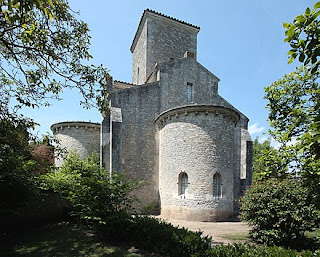For religion, this meant calling Synods. "Synod" is from Greek syn ("together"; think "synthesis") and odos (pronounced with an initial "h" sound; "road" or "journey"). A synod meant traveling along together, and was intended to make sure everyone was, let's say, synchronized.
The Synods of Aachen, held at the Carolingian palace complex of Aachen (pictured above), were an attempt to standardize certain practices for those following a religious life, of which there were two kinds: monastic and canonical. For the monastic, Emperor Louis the Pious (who called the synod in 816) gave to Benedict of Aniane the task of applying Benedictine rule (named for St. Benedict, not Benedict of Aniane) uniformly throughout the empire. Aniane had been mentioned here as a mentor of Theodulf.
There were difficulties in this task: the Benedictines had their own liturgical practices, but monasteries were under the rule of the local bishop, and many bishops preferred that everyone in their diocese adhere strictly to the Roman rite instead of the Benedictine variations. Aniane was flexible in allowing some deviations for the sake of good will.
Canons and canonesses lived a lifestyle that was monastic, but they were allowed to keep personal possessions. Chrodegang of Metz (died 766) had, in 755, established rules for the life of canons, known as the Rule of Chrodegang. It was founded on the Rule of St. Benedict, but recognized the different needs of those who lived a communal life but were working in the world to administer to spiritual needs of the faithful, instead of withdrawing from the world.
The Synod of Aachen incorporated much of Chrodegang's work. Canons were to celebrate the liturgy of the hours and general services and maintain a common dormitory and dining hall. Canons were overseen by a provost; canonesses were overseen by an abbess.
Another synod was held at Aachen in 817, building on the decisions of the year before. A further synod in 819 detailed the services owed by monasteries to the crown.
I was thinking a second reference to Benedict of Aniane meant he might need some more details, but Chrodegang had a more interesting life (not being a monk like Aniane, he "got out" more), so I'll tell you more about him tomorrow.

